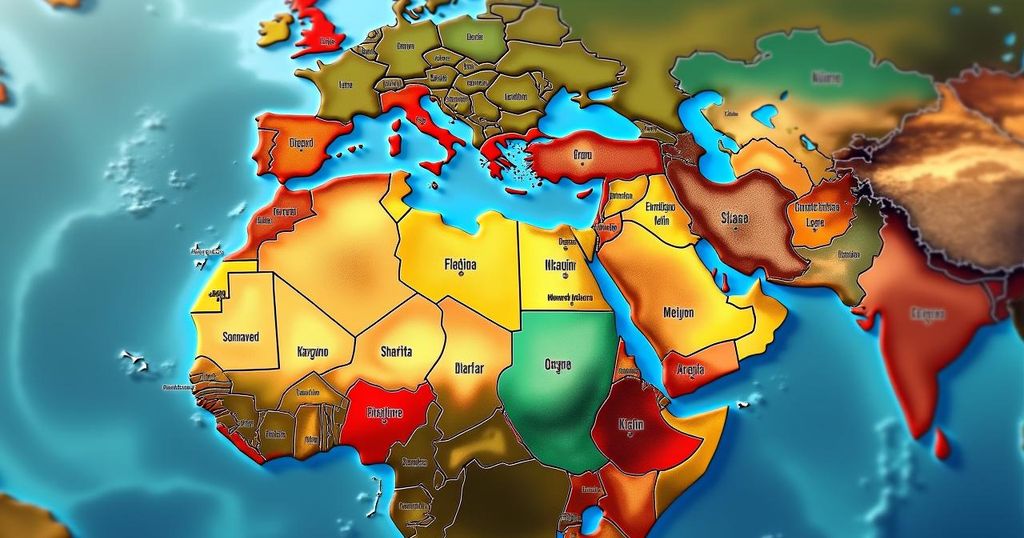On October 10, 2023, Eritrea’s leader hosted a trilateral summit with Somalia and Egypt to address regional tensions stemming from Ethiopia’s actions, particularly regarding Somaliland. The leaders aimed to deepen cooperation to combat terrorism and fortify Somali state institutions while expressing concerns over Ethiopian ambitions. Despite the inflammatory circumstances, experts predict that military confrontation remains unlikely in the short term.
On October 10, 2023, Eritrea’s long-standing leader, Isaias Afwerki, convened a significant trilateral summit in Asmara with President Hassan Sheikh Mohamud of Somalia and President Abdel Fattah el-Sisi of Egypt. During this meeting, the leaders addressed regional stability, notably expressing their intentions to collaboratively confront any external influence on their nations’ internal affairs, as stated in a joint declaration. The discussion also focused on enhancing cooperation among the three nations to bolster Somali state institutions. This initiative aims to empower Somalia in combating terrorism, safeguarding its land and maritime borders, and ensuring its territorial integrity. The summit emerged from escalating tensions with Ethiopia, particularly between Ethiopia and Somalia, which had worsened since January due to Ethiopia’s recent agreement with the self-declared republic of Somaliland. This development stirred controversy, as Somalia claims Somaliland as part of its territory. Ethiopia’s suggestion to acknowledge Somaliland’s autonomy in exchange for a coastal area for a potential naval base has intensified Somalia’s grievances. Egypt has capitalized on this discord, seeking to pressure Ethiopia over the Grand Ethiopian Renaissance Dam (GERD), which Cairo perceives as a substantial threat to its water security. Following a military cooperation pact with Somalia in August, Egypt has supplied weapons to Mogadishu and considered deploying troops to replace Ethiopian forces currently engaged in counter-terrorism efforts against Al-Shabaab, particularly in response to Somalia’s ultimatum for Ethiopian forces to withdraw unless the Somaliland agreement is rescinded. Although Eritrea historically aligned with Ethiopia during the Tigray civil conflict, its current relations have soured. Afwerki, critical of the peace deal between the Ethiopian government and the Tigray People’s Liberation Front (TPLF), remains wary of Ethiopia’s intentions toward Eritrea’s ports. Analysts like Abel Abate Demissie contend that Afwerki seeks to fortify his position by aligning with Ethiopia’s regional adversaries, fearing potential military conflict due to Ethiopia’s aspirations regarding port access. Despite the incendiary rhetoric and the apparent realignment of regional alliances, experts, including Omar Mahmood, suggest that a direct military confrontation is unlikely in the near term due to Somalia’s military weaknesses and Egypt’s domestic challenges, including economic hardships and ongoing conflicts in the Middle East. There are concerns that the previous diplomatic progress achieved during the rapprochement of 2018 has substantially regressed, reminiscent of a stagnant state of ‘no war, no peace’ between Ethiopia and Eritrea.
The geopolitical landscape in the Horn of Africa remains complex, with historical tensions impacting the relations among Ethiopia, Eritrea, Somalia, and Egypt. These dynamics are often further complicated by territorial disputes and external influences regarding economic and military arrangements. The trilogy of Eritrea, Somalia, and Egypt’s meeting signifies a strategic coalition formed in light of perceived threats from Ethiopia, particularly following Ethiopia’s attempts to deepen its ties with Somaliland, a region that Somalia contends is part of its territory. Additionally, the politics surrounding the GERD has added another layer of tension, with Egypt attempting to consolidate alliances to counter Ethiopia’s regional dominance.
In summary, the October 10 summit between Eritrea, Somalia, and Egypt highlights a significant effort to confront regional instability stemming from Ethiopian maneuvers, especially concerning the contentious Somaliland agreement. While the leaders aim to enhance Somalia’s institutional capacity and territorial integrity, underlying fears of Ethiopian ambition complicate the relationship dynamics. As tensions rise, the historical grievances and aspirations for control over strategic resources underscore the fragile state of peace in the Horn of Africa. Nonetheless, the prospect of direct confrontation appears limited due to internal challenges faced by each nation involved.
Original Source: www.theafricareport.com







